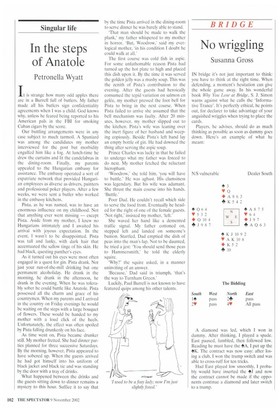In the steps of Anatole
Petronella Wyatt
It is strange how many odd apples there are in a Burrell full of butlers. My father made all his butlers sign confidentiality agreements when I was a child. God knows why, unless he feared being reported to his American pals in the FBI for smoking Cuban cigars by the score.
Our buttling arrangements were in any case subject to much turmoil. A Spaniard was among the candidates my mother interviewed for the post but morbidity engulfed him like a fog. At lunch-time he drew the curtains and lit the candelabras in the dining-room. Finally, my parents appealed to the Hungarian embassy for assistance. The embassy operated a sort of expatriate network that provided Hungarian employees as diverse as drivers, painters and professional poker players. After a few weeks, we were sent a butler who worked in the embassy kitchens.
Pista, as he was named, was to have an enormous influence on my childhood. Not that anything ever went missing — except Pista. Aside from my mother, I knew no Hungarians intimately and I awaited his arrival with joyous expectation. In the event, I wasn't to be disappointed. Pista was tall and lanky, with dark hair that accentuated the sallow tinge of his skin. He had black, questing panther's eyes.
As it turned out his eyes were most often engaged in a quest for gin. Pista drank. Not just your run-of-the-mill drinking but one permanent alcoholiday. He drank in the morning, he drank in the afternoon, he drank in the evening. When he was tolerably sober he could buttle like Anatole. Pista possessed all the charm and grace of his countrymen. When my parents and I arrived in the country on Friday evenings he would be waiting on the steps with a large bouquet of flowers. These would be handed to my mother with a loud click of the heels. Unfortunately, the effect was often spoiled by Pista falling drunkenly on his face.
As time went on, Pista became drunker still. My mother fretted. She had dinner parties planned for three successive Saturdays. By the morning, however, Pista appeared to have sobered up. When the guests arrived he had got himself into his uniform of black jacket and black tie and was standing by the door with a tray of drinks.
What happened between the drinks and the guests sitting down to dinner remains a mystery to this hour. Suffice it to say that by the time Pista arrived in the dining-room to serve dinner he was barely able to stand.
'That man should be made to walk the plank,' my father whispered to my mother in horror. 'But, Woodrow,' said my everlogical mother, 'in his condition I doubt he could walk at all.'
The first course was cold fish in aspic. For some unfathomable reason Pista had turned up the hot plate to high and placed this dish upon it. By the time it was served the golden jelly was a mushy soup. This was the zenith of Pista's contribution to the evening. After the guests had heroically consumed the tepid variation on salmon en gelee, my mother pressed the foot bell for Pista to bring in the next course. When Pista failed to arrive she assumed that the bell mechanism was faulty. After 20 minutes, however, my mother slipped out to the kitchen. Pista's wife was leaning over the inert figure of her husband and weeping copiously. Beside Pista's left hand lay an empty bottle of gin. He had downed the thing after serving the aspic soup.
Prince Charles was lucky in that he failed to undergo what my father was forced to do next. My mother fetched the reluctant hierophant.
'Woodrow,' she told him, 'you will have to buttle.' He was aghast. His clumsiness was legendary. But his wife was adamant. She thrust the main course into his hands. 'Buttle.'
Poor Dad. He couldn't recall which side to serve the food from. Eventually he headed for the right of one of the female guests. 'Not right,' insisted my mother, 'left.'
She waved her hand like a demented traffic signal. My father cottoned on, stepped left and landed on someone's bunion. Startled, Dad emptied the dish of peas into the man's lap. Not to be daunted, he tried a jest 'You should send those peas to Hammersmith,' he told the elderly squire.
'Why?' the squire asked, in a manner uninviting of an answer.
'Because,' Dad said in triumph, 'that's the way to Turnham Green.'
Luckily, Paul Burrell is not known to have featured quips among his other talents.


















































































































 Previous page
Previous page